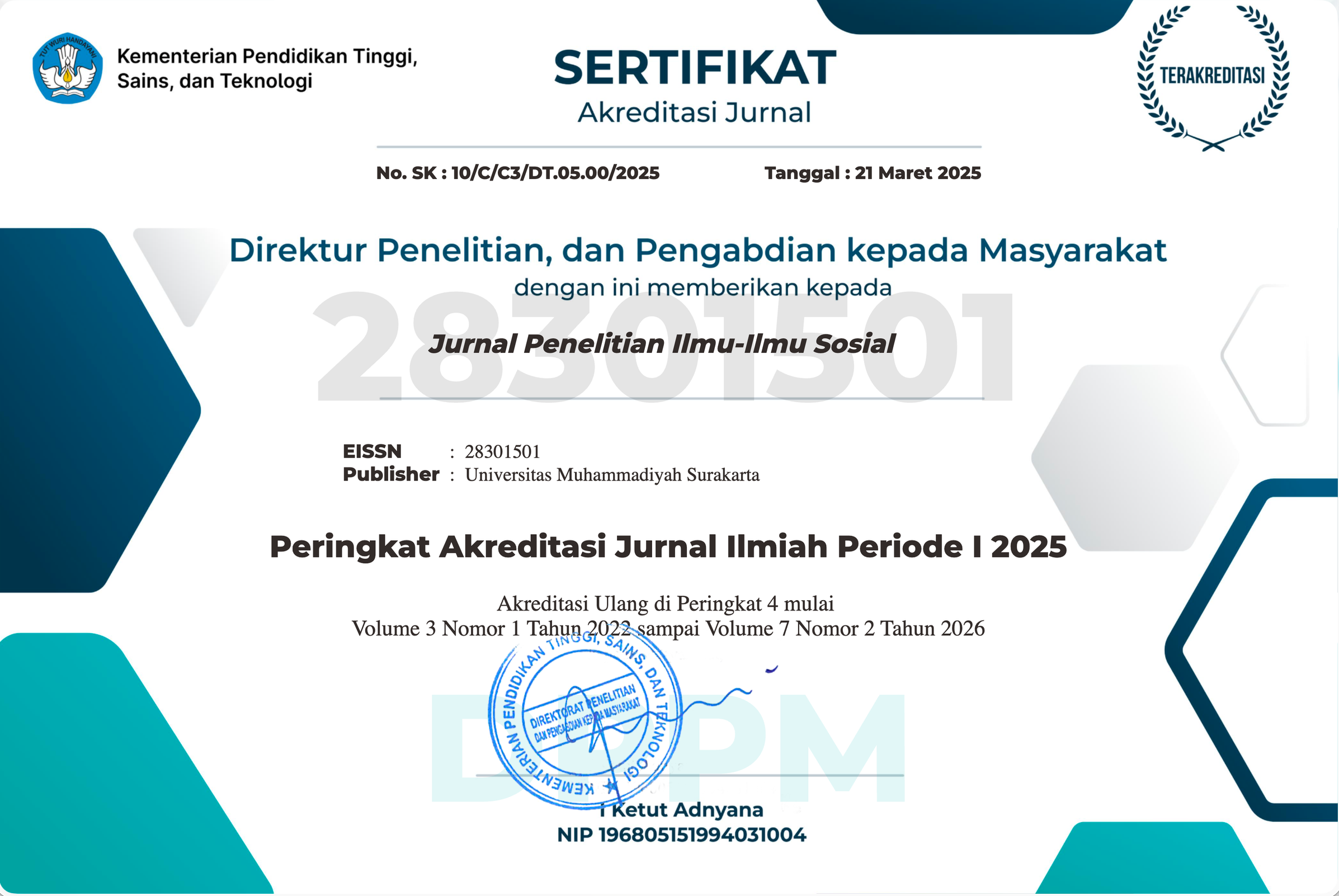Symbolic Threat Mediated Collective Narcissism and Antisemitic Conspiracy Belief
DOI:
https://doi.org/10.23917/sosial.v6i2.12054Keywords:
antisemitic, conspiracy theories, symbolic threatAbstract
This study aimed to analyze the mediating role of symbolic threat in the relationship between collective narcissism and belief in antisemitic conspiracy theories. The Jewish community in Indonesia is almost nonexistent, yet antisemitic conspiracy theories are relatively widespread. Jews have been used as scapegoats in events that had significant global impact and are often perceived as a threat through symbols associated with them. A bootstrapped mediation analysis with 5,000 iterations was conducted to examine the role of symbolic threat as a mediator between collective narcissism and belief in antisemitic conspiracy theories. Participants were recruited online, and 385 respondents (Mage = 21.57) completed the belief in Jewish conspiracy theory scale, the collective narcissism scale, and the symbolic threat scale. The analysis revealed that symbolic threat significantly mediated the relationship between collective narcissism and belief in antisemitic conspiracy theories (B = 0.51, SE = 0.06, CI95% = 0.40–0.62, p < .001). Individuals with higher levels of collective narcissism tended to perceive Jews as symbolic threats, which in turn predicted stronger belief in antisemitic conspiracy theories. This study demonstrated how symbolic threat contributes to conspiratorial belief formation and provided empirical evidence on antisemitic attitudes in Indonesia. Furthermore, the findings contributed to extending intergroup relations discourse regarding perceptions of Jews in Southeast Asia.
Downloads
References
ADL. (2014). Index Score: Indonesia. ADL Global 100. https://global100.adl.org/country/indonesia/2014
Ainslie, M. J. (2019). Anti-Semitism in Contemporary Malaysia: Malay Nationalism, Philosemitism and Pro-Israel Expressions. Springer Singapore. https://doi.org/10.1007/978-981-13-6013-8
Ali, M. (2010). ‘They Are Not All Alike’: Indonesian Muslim intellectuals’ perception of Judaism and Jews. Indonesia and the Malay World, 38(112), 329–347. https://doi.org/10.1080/13639811.2010.513845
Bertin, P., Nera, K., & Delouvée, S. (2020). Conspiracy Beliefs, Rejection of Vaccination, and Support for hydroxychloroquine: A Conceptual Replication-Extension in the COVID-19 Pandemic Context. Frontiers in Psychology, 11. https://doi.org/10.3389/fpsyg.2020.565128
Bilewicz, M., & Krzeminski, I. (2010). Anti-Semitism in Poland and Ukraine: The Belief in Jewish Control as a Mechanism of Scapegoating. International Journal of Conflict and Violence, 4(2), 234–243.
Bowes, S. M., Costello, T. H., & Tasimi, A. (2023). The conspiratorial mind: A meta-analytic review of motivational and personological correlates. Psychological Bulletin. https://doi.org/10.1037/bul0000392
Burhanuddin, B. (2007). Conspiracy of Jews: The quest for Anti-Semitism in Media Dakwah. Graduate Journal of Asia-Pacific Studies, 5, 53–76.
Cichocka, A., Golec de Zavala, A.., Marchlewska, M., & Olechowski, M. (2015). Grandiose delusions: Collective narcissism, secure in-group identification, and belief in conspiracies. Dalam The psychology of conspiracy (hlm. 42–61). Routledge/Taylor & Francis Group.
Cichocka, A., Marchlewska, M., & Golec de Zavala, A.. G. (2016). Does Self-Love or Self-Hate Predict Conspiracy Beliefs? Narcissism, Self-Esteem, and the Endorsement of Conspiracy Theories. Social Psychological and Personality Science, 7(2), 157–166. https://doi.org/10.1177/1948550615616170
Cichocka, A., Marchlewska, M., Golec de Zavala, A., & Olechowski, M. (2016). “They will not control us”: Ingroup positivity and belief in intergroup conspiracies. British Journal of Psychology (London, England: 1953), 107(3), 556–576. https://doi.org/10.1111/bjop.12158
Douglas, K. M., Uscinski, J. E., Sutton, R. M., Cichocka, A., Nefes, T., Ang, C. S., & Deravi, F. (2019). Understanding Conspiracy Theories. Political Psychology, 40(S1), 3–35. https://doi.org/10.1111/pops.12568
Glaeser, E. L. (2005). The Political Economy of Hatred*. The Quarterly Journal of Economics, 120(1), 45–86. https://doi.org/10.1162/0033553053327434
Golec de Zavala, A. (2021). Why Is Populism So Robustly Associated with Conspiratorial Thinking? Collective Narcissism and the Meaning Maintenance Model. Dalam J. D. Sinnott & J. S. Rabin (Ed.), The Psychology of Political Behavior in a Time of Change (hlm. 277–290). Springer International Publishing. https://doi.org/10.1007/978-3-030-38270-4_12
Golec de Zavala, A., Bierwiaczonek, K., & Ciesielski, P. (2022). An interpretation of meta-analytical evidence for the link between collective narcissism and conspiracy theories. Current Opinion in Psychology, 47, 101360. https://doi.org/10.1016/j.copsyc.2022.101360
Golec de Zavala, A., & Cichocka, A. (2012). Collective narcissism and anti-Semitism in Poland. Group Processes & Intergroup Relations, 15(2), 213–229. https://doi.org/10.1177/1368430211420891
Golec de Zavala, A., Cichocka, A., Eidelson, R., & Jayawickreme, N. (2009). Collective narcissism and its social consequences. Journal of Personality and Social Psychology, 97(6), 1074–1096. https://doi.org/10.1037/a0016904
Golec de Zavala, A., & Lantos, D. (2020). Collective Narcissism and Its Social Consequences: The Bad and the Ugly. Current Directions in Psychological Science, 29(3), 273–278. https://doi.org/10.1177/0963721420917703
Hadler, J. (2004). Translations of antisemitism: Jews, the Chinese, and violence in colonial and post-colonial Indonesia. Indonesia and the Malay World, 32(94), 291–313. https://doi.org/10.1080/13639810500031012
Hayes, A. F. (2018). Introduction to mediation, moderation, and conditional process analysis: A regression-based approach (Second edition). Guilford Press.
Ichsan, M. (2017). The Legality Of Interreligious Marriage In The Perspective Of Islamic Law And Indonesian Positive Law. Profetika: Jurnal Studi Islam, 17(02), Article 02. https://doi.org/10.23917/profetika.v17i02.5300
Jolley, D., Meleady, R., & Douglas, K. M. (2020). Exposure to intergroup conspiracy theories promotes prejudice which spreads across groups. British Journal of Psychology, 111(1), 17–35. https://doi.org/10.1111/bjop.12385
Kofta, M., Soral, W., & Bilewicz, M. (2020). What breeds conspiracy antisemitism? The role of political uncontrollability and uncertainty in the belief in Jewish conspiracy. Journal of Personality and Social Psychology, 118, 900–918. https://doi.org/10.1037/pspa0000183
Lim, M. (2005). Islamic Radicalism and Anti-Americanism in Indonesia: The Role of the Internet (Washington). East-West Center.
Marchlewska, M., Cichocka, A., Łozowski, F., Górska, P., & Winiewski, M. (2019). In search of an imaginary enemy: Catholic collective narcissism and the endorsement of gender conspiracy beliefs. The Journal of Social Psychology, 159(6), 766–779. https://doi.org/10.1080/00224545.2019.1586637
Mashuri, A., & Zaduqisti, E. (2015). The effect of intergroup threat and social identity salience on the belief in conspiracy theories over terrorism in indonesia: Collective angst as a mediator. International Journal of Psychological Research, 8(1), 24. https://doi.org/10.21500/20112084.642
Muhtadi, B. (2007). The Conspiracy of Jews: The Quest for Anti-Semitism in Media Dakwah. Graduate Journal of Asia-Pacific Studies, 5(2), 53–76.
Mustakim, H. (2017). Ahlu Kitab Menurut Sayyid Quthb Dalam Tafsir Fi Zilal Al-Qur’an. Profetika: Jurnal Studi Islam, 17(02), Article 02. https://doi.org/10.23917/profetika.v17i02.5299
Navarro, D. J., & Foxcroft, D. R. (2018). Learning statistics with jamovi: A tutorial for psychology students and other beginners. Danielle J. Navarro and David R. Foxcroft. https://doi.org/10.24384/HGC3-7P15
Nugroho, J. (2023, Maret 21). Indonesia’s Jews Come Out. Tablet Magazine. https://www.tabletmag.com/sections/community/articles/indonesia-jews-come-out
Poli, B. D. (2018). Anti-Jewish and Anti-Zionist Conspiracism in the Arab World: Historical and Political Roots. Dalam Handbook of Conspiracy Theory and Contemporary Religion (hlm. 321–342). Brill. https://doi.org/10.1163/9789004382022_016
Prihatno, S. (2016). pengaruh theosofi dan freemason di indonesia (Kajian Analitis Simbol-simbol Theosofi dan Freemason dalam Lirik Lagu dan Sampul Kaset Album Grup Musik Dewa 19). Profetika: Jurnal Studi Islam, 17(01), Article 01. https://doi.org/10.23917/profetika.v17i01.2098
Rachmadi, A. A. (2023, Januari 10). Cek Fakta: Heboh Isu Lato-lato Artinya “Aku Yahudi”, Benarkah? https://www.pikiran-rakyat.com/cek-fakta/pr-016091769/cek-fakta-heboh-isu-lato-lato-artinya-aku-yahudi-benarkah
Reid, A. (2010). Jewish-Conspiracy Theories In Southeast Asia: Are Chinese the target? Indonesia and the Malay World, 38(112), 373–385. https://doi.org/10.1080/13639811.2010.513848
Rijal, S. (2005). Media and Islamism in Post-New Order Indonesia: The Case of Sabili. Studia Islamika, 12(3). https://doi.org/10.15408/sdi.v12i3.582
Rompies, K., & Barrett, C. (2022, Februari 6). Keeping the faith, quietly: Inside Muslim Indonesia’s hidden Jewish community. The Sydney Morning Herald. https://www.smh.com.au/world/asia/keeping-the-faith-quietly-inside-muslim-indonesia-s-hidden-jewish-community-20220203-p59tnv.html
Shadiqi, M. A., Muluk, H., & Milla, M. N. (2020). Support for Palestinian among Indonesian Muslim: Religious identity and solidarity as reasons for e-petition signing. Psychological Research on Urban Society, 3(1), 40. https://doi.org/10.7454/proust.v3i1.83
Sholihah, ‘Amilatu, & Hasan, M. A. K. (2020). Analisis Ibdal Dalam Al-Qur’an Perspektif Abu Hayyan Al-Andalusia An-Naysaburi Dan An-Nasafi (Studi Komparasi Atas Penafsiran Q.S. At-Taubah: 33, Q.S. Al-Fath: 28, Dan Q.S. As-Saf: 9). Profetika: Jurnal Studi Islam, 21(2), Article 2. https://doi.org/10.23917/profetika.v21i2.13080
Stephan, W. G., Ybarra, O., & Morrison, K. R. (2009). Intergroup threat theory. Dalam Handbook of prejudice, stereotyping, and discrimination (hlm. 43–59). Psychology Press.
Sumandoyo, A. (2017, April 7). Sejarah Kebencian terhadap Yahudi di Indonesia. tirto.id. https://tirto.id/sejarah-kebencian-terhadap-yahudi-di-indonesia-crWa
Sutton, R. M., & Douglas, K. M. (2020). Conspiracy theories and the conspiracy mindset: Implications for political ideology. Current Opinion in Behavioral Sciences, 34, 118–122. https://doi.org/10.1016/j.cobeha.2020.02.015
Swami, V. (2012). Social Psychological Origins of Conspiracy Theories: The Case of the Jewish Conspiracy Theory in Malaysia. Frontiers in Psychology, 3. https://doi.org/10.3389/fpsyg.2012.00280
van Bruinessen, M. (1994). Yahudi sebagai Simbol dalam Wacana Islam Indonesia Masa Kini ["Jews as Symbols in Contemporary Indonesian Islamic Discourse"]. Dalam Spiritualitas baru: Agama dan aspirasi rakyat (hlm. 253–268). Dian/Interfidei. https://dspace.library.uu.nl/handle/1874/20532
van Bruinessen, M. (2013). Rakyat Kecil, Islam, dan Politik. Dalam Yahudi sebagai Simbol dalam Wacana Islam Indonesia Masa Kini (hlm. 261–282). Gading. https://www.academia.edu/7837188/Yahudi_sebagai_Simbol_dalam_Wacana_Islam_Indonesia_Masa_Kini
van Prooijen, J. W., & Song, M. (2021). The cultural dimension of intergroup conspiracy theories. British Journal of Psychology, 112(2), 455–473. https://doi.org/10.1111/bjop.12471
Wicaksono, P. (2020, Mei 13). Cek Fakta: Hoaks Konspirasi Komunis, Yahudi dan Nasrani Manfaatkan COVID-19 untuk Menghancurkan Islam. liputan6.com. https://www.liputan6.com/cek-fakta/read/4253224/cek-fakta-hoaks-konspirasi-komunis-yahudi-dan-nasrani-manfaatkan-covid-19-untuk-menghancurkan-islam
Wismabrata, M. (2019, Juni 11). 6 Fakta Tudingan Iluminati di Masjid Al Safar, Ustaz Bantah Jatuhkan Ridwan Kamil hingga Penjelasan Bentuk Segitiga Halaman all. KOMPAS.com. https://regional.kompas.com/read/2019/06/11/19253301/6-fakta-tudingan-iluminati-di-masjid-al-safar-ustaz-bantah-jatuhkan-ridwan
Zein, R. A., Arinda, M. F., Rikardi, A. A., Ridlo, I. A., & Ardelia, V. (2020). The Enemy of ‘Ummah: Belief in Jewish conspiracy theories indirectly affected vaccination decisions. PsyArXiv. https://doi.org/10.31234/osf.io/53qsk
Zein, R. A., Suhariadi, F., Alfian, I. N., & Hadi, C. (2018). Ideological preference and political behaviour: A case study of Indonesia 2019 presidential election. https://doi.org/10.17605/OSF.IO/RFVTK

Downloads
Submitted
Accepted
Published
Issue
Section
License
Copyright (c) 2025 Audi Ahmad Rikardi, Rizqy Amelia Zein

This work is licensed under a Creative Commons Attribution 4.0 International License.















